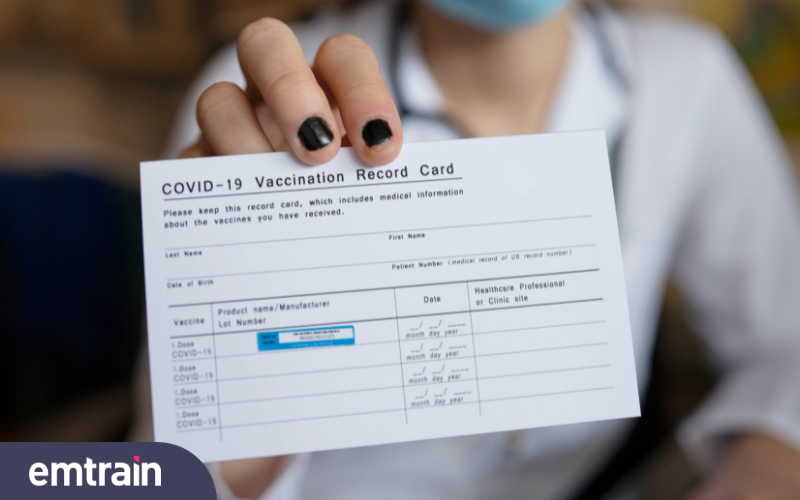Over this past year, workplaces have been forced to deal with more polarizing issues than ever before. Now, as states loosen up on COVID precautions, employers are faced with yet another hurdle: returning to offices. While many employees may be eager to dust off their desks, others may be apprehensive. When you do open up your doors, HR teams will have to deal with varying degrees of comfort, new office safety precautions, and, in some cases, disclosure of vaccination records. That last issue is likely to be the most problematic of the bunch. Some workers will feel perfectly comfortable providing that information, while others will be apprehensive. There is also potential for new, culture damaging in-group/out-group dynamics to pop up.
In-group/out-group dynamics stem from the degree that ‘us vs. them’ mentality and behaviors drive employee acceptance, inclusion, and perceived value. Vaccination status poses a significant risk of exacerbating an in-group/out-group divide. The best way to combat these dynamics are healthy organizational norms. Employers may need to take more tangible steps to discourage these behaviors. Requiring that all employees receive vaccines is one obvious step employers can take to eliminate this divide, but that can create a whole other set of problems. Similarly, asking for proof of vaccine status would seem like a reasonable step when returning to work. Policies that all employees would be required to adhere to could act as an equalizer, though there is always potential for them to result in deeper polarization. Whether or not your company intends to require employees to return to work, it is important that you proceed with caution when it comes to vaccine statuses, vaccine requirements, and employee safety.
Requiring Proof of Vaccination Status
The CDC reports that 60% of adults are now fully vaccinated, with over 71% of adults have received at least one dose, and now over 23% of adults have taken the booster shot. While these numbers are promising, reports indicate that it will be difficult to vaccinate those who have yet to receive their shot. This may be because of health concerns, uncertainty over long-term side effects, or even ideological opposition; whatever the reason, this is a very polarizing issue.

With that said, employers requiring employees to have proof of vaccination before returning to work could create potential issues. Additionally, some state and local authorities are requiring that employers determine vaccination status of their employees before returning to the workplace. Those employees who show up to the office would be able to assume that those who stayed home are unvaccinated. And with vaccines being available for almost everyone nationwide, this would imply that those employees who stayed home chose not to be vaccinated.
Alternatively, states such as Florida have banned vaccine passports altogether. The bill, SB 2006, stipulates that entities found requiring COVID-19 vaccination records could face fines of up to $5,000. While this may come as a relief to employees who were concerned about divulging medical information, it creates additional hurdles for employers looking to return to the office while guaranteeing the safety of their employees. This goes both ways, as many employees may not want to return to work without the guarantee that their coworkers are vaccinated.
But what do workers think?
This past March, SHRM conducted a survey of employed Americans, asking questions about vaccine willingness and government and employer-required vaccinations. The survey found that 52% of respondents favor employer-required vaccinations. That is to say, a slight majority believe that employers should require that their employees be vaccinated for COVID-19. Younger respondents were more likely to favor policies such as this. Additionally, employees of color were also more likely to support vaccine requirements than white respondents. SHRM speculated that this is because of the disproportionate effect that COVID has had on communities of color.
While these numbers are helpful, they are not a replacement for addressing the concerns and anxiety that your particular workforce is feeling. Many employees may have lost loved ones to COVID-19, some might still be struggling financially due to a lay-off in their family, and some may have developed more generalized anxiety following a year of sheltering in place. The transition back to the workspace is a delicate time for many people, and concerns might run deeper than those of whether or not coworkers are vaccinated. This is a time to check in with your workforce, and reassure them that you are taking steps to ensure their safety. This might be requiring proof of vaccination, but it might also look like continuing social distancing, enforcing masks, and ensuring diligent sanitation.
Requiring Vaccination
If an organization requires that employees get vaccinated, they must remain in compliance with the Americans with Disabilities Act (ADA) and other relevant laws. The Equal Employment Opportunity Commission has provided some guidance on the subject, and any employers planning on requiring employees to receive vaccines should consult their legal and compliance teams. But in the interim, here are a few important things to consider:
-
- Employers may need to provide employees who will not receive a vaccine for religious reasons with reasonable accommodations.
- Employers may need to provide employees who cannot receive a vaccine due to health concerns with reasonable accommodations.
- Employers may need to provide employees with paid time off in order to receive their vaccines.
- Employers will need to decide whether employees who will not receive a vaccine pose a “direct threat,” per the EEOC’s standards, to their coworkers or customers.
- If reasonable accommodation cannot be made for these employees, then employers may need to consider a remote work policy or a leave of absence.
While many employers and states are requiring vaccinations in order for employees to return to work, this decision should not be made lightly. Implications for employee retention and possible outcomes on workplace culture should be taken into consideration.
Company Culture Check-Ins
At this point, it is clear that the return to work will be a challenge for a myriad of reasons. Thus, it is crucial that HR and People Ops teams regularly check in on company culture. This may come in the form of addressing levels of comfort and safety prior to the return to work, asking employees to weigh in on potential vaccine requirements, or continuing to communicate with employees other steps your organization is taking to keep them safe. This would also be a good time to train employees on how to move past differences and avoid making assumptions about other employees based on vaccination status or office attendance.
This is where Emtrain comes in. Our suite of microlessons can help you with a smooth transition back to work, measure employees’ levels of comfort returning to work, and train on emotional intelligence in order to avoid workplace drama. Our newest microlesson, Health Information Privacy Rights, can ensure compliance with EEOC guidance and help avoid any unnecessary claims to HR.










